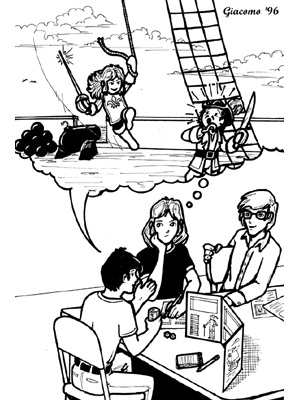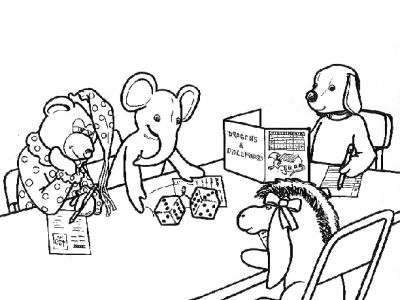Reconciling the Dual Nature of Player Characters
 The 1980's was one long journey down the road from pawn toward protagonist for the player characters in RPGs. The novelty of controlling a pawn as he crawled through mazes, battling monsters and collecting loot, was wearing off. Jaded players wanted more from their time at the gaming table, and they set off in two different directions seeking it. One of those directions was simulating reality, but those attempts largely dead-ended. Reality does a good enough job simulating reality all on its own, and the harder you try to compete, the more you get bogged down in details that are boring or depressing or icky. Role-players never actually wanted realism, they wanted a good-parts version of realism, which is what stories are. Gradually we relinquished the work of simulating reality to the personal computers that were rapidly changing our lives, and we focused our search for something more in the direction of storytelling. As we entered the 90's, "Vampire: The Masquerade" would emerge as the poster-child for that movement, using "storyteller" as a synonym for game master where early D&D had used "referee".
The 1980's was one long journey down the road from pawn toward protagonist for the player characters in RPGs. The novelty of controlling a pawn as he crawled through mazes, battling monsters and collecting loot, was wearing off. Jaded players wanted more from their time at the gaming table, and they set off in two different directions seeking it. One of those directions was simulating reality, but those attempts largely dead-ended. Reality does a good enough job simulating reality all on its own, and the harder you try to compete, the more you get bogged down in details that are boring or depressing or icky. Role-players never actually wanted realism, they wanted a good-parts version of realism, which is what stories are. Gradually we relinquished the work of simulating reality to the personal computers that were rapidly changing our lives, and we focused our search for something more in the direction of storytelling. As we entered the 90's, "Vampire: The Masquerade" would emerge as the poster-child for that movement, using "storyteller" as a synonym for game master where early D&D had used "referee".
To understand the dynamic that this new paradigm created, one really has to understand the job of a storyteller, which is to engage his audience with a plausible fiction that keeps it hungry to find out what happens next. Once all the questions have been answered, his story is done, and the storyteller hopes that his audience found the answers satisfying enough that they'll come looking to him to tell them another story later. A storyteller game-master, then, isn't some chess-master looking to test the limits of your resourcefulness in a game of wits, he's an entertainer who wants to keep you guessing and curious.
Early attempts at this style of game-mastering were clunky to say the least, and introduced us to the concept of "railroading". With no other road map to follow, GMs and game designers alike turned to the established storytelling patterns of movies and novels for inspiration -- all linear by nature. If you've been role-playing long enough to have read this far, you probably already know and loathe railroading. The problem, of course, is that it relegates players back to the role of passive audience, which is not the experience they signed up for.
At the opposite end of the spectrum from railroading, gamers generally say you'll find "sandbox" play, but in the storyteller's lexicon, the opposite of railroading would be "wish fulfillment". A railroaded RPG totally ignores the players' desires. Wish fulfillment gives them everything they want without making them work for it. In a dungeon-crawl game, in which the goal is to amass treasure, glory, treasure, power, and treasure, that's commonly known as a "Monty Haul" game: walk through some easy encounters, collect cool gear and lots of bling. In traditional storytelling, it's most infamously the plot of nearly all "adult" films and literature. In either case, the story exists as nothing but some context for a fantasy. Wish fulfillment is what you get out of an RPG when the GM realizes that it's all about the players, but fails to grasp that both pawns and protaganists share one common thread: they exist for the sake of conflict. Without conflict and uncertainty, you have no game, and you have no story.
This sets up another dilemma about the nature of RPGs. Assuming we follow the tradition of first-person role-playing in which each player is allowed control of a single piece in the game (i.e: player character), the clear and obvious goal for each player is to achieve any personal aims attributed to his character. The clear and obvious goal for the GM then becomes standing in the way of his players' goals. Yet within the game he's necessarily omniscient, omnipotent, omnipresent. Even when he's showing restraint, you get scenarios like these:
Four goblins won't be enough to bloody them: I'd better put another one in this room.
There are five goblins in the room when the PC's enter. The fifth goblin rolls a lucky critical with its arrow on the first round, slaying the party's magic user just before he could get off his sleep spell that would have ended the fight. Half the party winds up dying in the encounter because the GM tried to make them burn a few extra hit points, based on nothing more than gut instinct.
They let the bandit king go. Guess I'll roll to see how grateful he is. 11...? Seems pretty grateful. He'd probably ask Redscale to spare their lives, and Redscale surely owes him a favor by now.
A total party kill at the claws of the dragon morphs into a total party capture. Rather than shredding their character sheets and starting over, the players prep their beloved group of 14th-level adventurers to go off on a quest Redscale assigned them, all because of the GM's subjective intepretations of one roll and of the relationship between two NPCs.
Hmmm... the druid's butterfly familiar flapped its wings in Minas Tirith. Wouldn't it be cool if that meant rain in Mordor?
Frodo suffers a -2 penalty to his climb check on the wet mountain side. He fails his roll by 1 point and slips to his doom. Sauron recovers the ring. Minas Tirith falls. The age of men ends because the GM saw Jurassic Park twenty years ago, and Jeff Goldblum's explanation of chaos theory stuck with him.
 Each of these examples hinges on a single reasonable-enough but subjective GM's-call that completely alters the course of a campaign. For a GM to claim, "It's not me, it's the dice!", "It's not me, it's the rules!", or "It's not me, that's what's written in the adventure!" are all cop-outs. The game master decides. Even if what she decides is to roll dice and not fudge the rolls, she chooses how to weight the probabilities of each roll before it hits the table. She decides which adventures to pull off the shelf and play. She decides how to populate her sandbox. She decides what every NPC will choose to do in every unscripted situation, of which we hope there will be many. She decides whether any moment of play is worthy of an exemption from the normal flow and rules. ("You kick sand in the beholder's face?" Time to look up the sand-throwing combat sub-system? Yeah, right. Well, that eye's a pretty-big target, so... "If you can roll a total of 15 to-hit, you can disable it's main eye ability for 1d6 rounds.") Moment by moment by moment, throughout the life of her game, she decides -- because if she doesn't decide, she's not a game master, she's that Sigourney Weaver character in Galaxy Quest, parroting whatever the computer has already said to the rest of the crew because that's her one job on the ship.
Each of these examples hinges on a single reasonable-enough but subjective GM's-call that completely alters the course of a campaign. For a GM to claim, "It's not me, it's the dice!", "It's not me, it's the rules!", or "It's not me, that's what's written in the adventure!" are all cop-outs. The game master decides. Even if what she decides is to roll dice and not fudge the rolls, she chooses how to weight the probabilities of each roll before it hits the table. She decides which adventures to pull off the shelf and play. She decides how to populate her sandbox. She decides what every NPC will choose to do in every unscripted situation, of which we hope there will be many. She decides whether any moment of play is worthy of an exemption from the normal flow and rules. ("You kick sand in the beholder's face?" Time to look up the sand-throwing combat sub-system? Yeah, right. Well, that eye's a pretty-big target, so... "If you can roll a total of 15 to-hit, you can disable it's main eye ability for 1d6 rounds.") Moment by moment by moment, throughout the life of her game, she decides -- because if she doesn't decide, she's not a game master, she's that Sigourney Weaver character in Galaxy Quest, parroting whatever the computer has already said to the rest of the crew because that's her one job on the ship.
The GM can't really treat player-characters like pawns because she can wipe them off the board with a few words. Nor can she really treat player-characters like protagonists because their players require the freedom to make choices with meaningful consequences, up to and including the inconveniently early demise of their own characters. All of which means that any argument on how to play an RPG that reduces the role of the GM to either impartial referee or artful storyteller is missing the big picture. I suspect that RPGs shall ultimately find their identity in the modern trend toward meta-game rules about how the story itself will progress (as opposed to rules purely about the minutae of actions taken by a character), because therein lies the crux of the matter. No matter how useful rules governing a simulated physical reality are, they will always play second-fiddle to the power invested in a game master, but meta-rules that impact the flow of the story itself can apply a whole new layer to the game that strengthens collaboration between GM and players without throwing dramatic tension out the window.
Taking this phenomenon to the extreme, you wind up with games like Universalis and Microscope, that are nothing but meta-game rules and don't need a GM at all. Replacing the GM with a committee of players is a lot like replacing the GM with a computer, though: it addresses the problem of balancing the dual pawn/protagonist nature of player characters by getting rid of it entirely. That makes them a whole different style of game, and outside the realm of this discussion. But any existing RPG can be seasoned to taste with meta-game rules, as those game masters who aren't afraid to tinker have been proving for many years.
Next time, I'll finish up the series with specific thoughts on- and examples of meta-game rules.
Pawn or Protagonist? (Part 2)
Comment

Blog Search
Blog Archive
- September 2022 (1)
- August 2022 (1)
- July 2022 (1)
- May 2022 (1)
- March 2022 (1)
- February 2022 (4)
- January 2022 (5)
- July 2021 (2)
- April 2021 (1)
- December 2019 (1)
- May 2018 (1)
- September 2016 (1)
- October 2013 (1)
- June 2013 (2)
- May 2013 (2)
- April 2013 (2)
- March 2013 (2)
Comments
-
January 21, 2022
-
January 21, 2022
-
CraigNJanuary 21, 2022
-
Anat ElirazJanuary 20, 2022
-
Ann MarieApril 6, 2021

